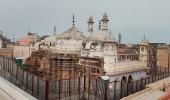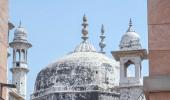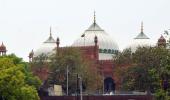The Varanasi district court arrived at the decision of allowing 'puja' in a Gyanvapi mosque cellar in "haste", the All India Muslim Personal Law Board (AIMPLB) said on Friday, asserting it would pursue the matter right up to the Supreme Court.

Muslim organisations under the umbrella of AIMPLB also said they are seeking time from President Droupadi Murmu to apprise her of their concerns and may also write to Chief Justice of India D Y Chandrachud.
The AIMPLB also said the Places of Worship Act, 1991, should be implemented in letter and spirit to prevent disputes arising in the country.
The AIMPLB's reaction came soon after the Allahabad high court on Friday adjourned till February 6 hearing on an appeal filed by the Anzuman Intezamia Masjid Committee challenging the Varanasi court order.
The committee, which looks after the affairs of the mosque, had moved the high court Thursday, within hours of the Supreme Court refusing to hear its plea against the Varanasi district court's order and asking it to approach the HC.
AIMPLB president Maulana Khalid Saifullah Rahmani said the decision of allowing puja at the mosque cellar has pained not only Muslims but people of other religions as well who believe in secularism.
"The notion that a mandir (temple) was demolished to build a mosque is wrong. Islam does not allow taking away someone's land to build a mosque," he said.
"The court ruled on it in haste and the other (Muslim) side was not even given a chance to put forward its arguments in detail. This has hurt the confidence of minorities in the judiciary," Rahmani told a press conference.
"In the Babri Masjid decision, it was accepted that the temple was not brought down to build a mosque but the decision was made in the favour of the other side on the basis of 'aastha (faith)'. Courts should rule on the basis of facts and not 'aastha'," he said.
He said the Places of Worship Act is a very important law as "we can prevent disputes through it".
If this is not implemented in letter and spirit it will give rise to disputes in the country, the AIMPLB president said.
Jamiat Ulema-e-Hind president Maulana Arshad Madani claimed the Muslim side was not given a chance to present its case before the court "we wanted to which is very disappointing".
"We will take the matter to the highest of courts," he said. "If such a big minority says that it is losing faith in the judiciary, it is not good for the country."
Some people are saying that the matter of Gyanvapi came into existence after the Places of Worship Act, 1991, but the fundamental principle of the law is that the place of worship as it stood in 1947 will remain the same, he said.
Maulana Mahmood Madani, who leads the other faction of the Jamiat, said it was a sad state of affairs in the country that "Muslims were being demonised".
If even the judiciary does not do justice, is there any other recourse for minorities, he asked.
AIMPLB spokesperson SQR Ilyas said the organisations appeal to Muslims to keep restraint because if they lose patience, it would neither be good for them nor for the country.
In a statement, the Muslim organisations said, "We believe that this time the dignity of the country and the impartiality of the judicial system and administrative affairs have been grossly compromised. It is the prime responsibility of all constitutional officials to take timely notice of it."
"In this critical hour, as representatives of Indian Muslims, we have requested time to communicate these concerns to the President of India. We hope that, at her level, she can take steps to address these issues. Additionally, we intend to convey the sentiments of the Muslim community to the Chief Justice of India in a respectful and appropriate manner," they said.
The Muslim organisations expressed "deep regret and concern" over the "abrupt" initiation of puja in cellar of the Gyanvapi mosque.
"The swift initiation of this action, despite the court granting a seven-day window for the administration to make necessary arrangements, raises questions about apparent collusion between the administration and the plaintiff, attempting to foreclose any effort by the mosque managing committee to pursue remedies against the district court order," they said.
The leaders of the Muslim bodies expressed surprise and disappointment at the judgment by the Varanasi district judge.
"In our perspective, this decision seems to rely on a highly incorrect and unfounded argument, asserting that the family of Somnath Vyas used to offer worship in the basement of the Gyanvapi Masjid until 1993, and it was closed on state government's orders. Moreover, on January 24, the same court handed over the custody of the basement to the district administration," the Muslim bodies said.
"It is imperative to clarify that no 'puja' was ever conducted in this basement.... Equally concerning is the unilateral disclosure of the archaeological survey report by the Hindu side to the press," they said.
The issue extends beyond the Gyanvapi Masjid as "baseless claims" are persistently made on other Muslim places of worship such as the Shahi Eidgah of Mathura, the Sunheri Masjid Delhi along with numerous mosques and Waqf properties across the country.
Besides representatives of the Markazi Jamiat Ahle Hadith Hind and the Jamaat-e-Islami Hind, AIMPLB working committee member Kamal Farooqui also attended the press conference among others.










